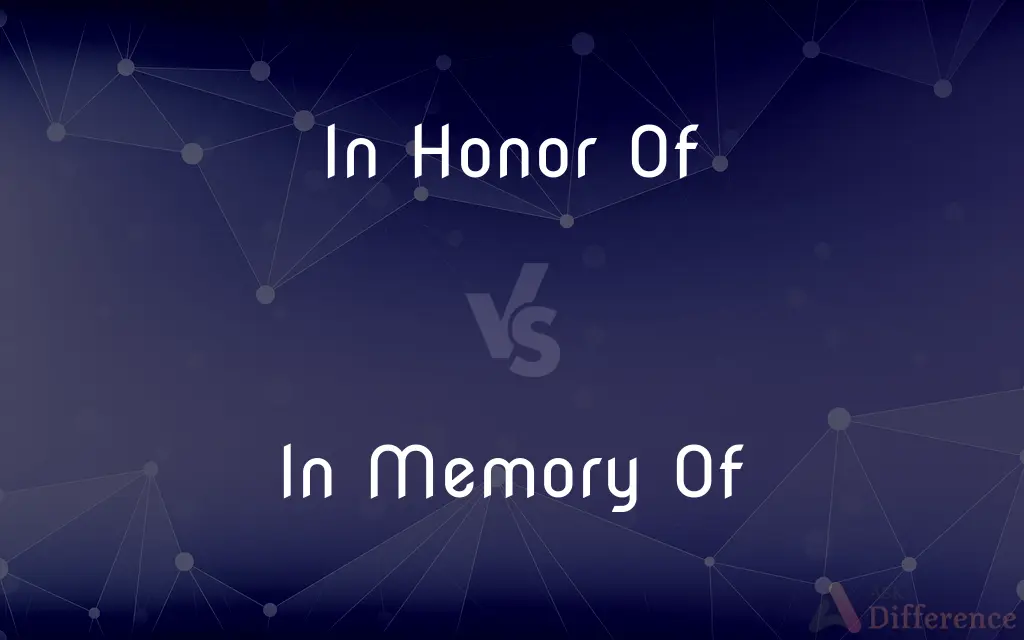In Honor Of vs. In Memory Of — What's the Difference?
By Tayyaba Rehman & Urooj Arif — Published on March 1, 2024
"In honor of" celebrates someone's life, achievements, or contributions, often used for living or deceased individuals, while "in memory of" specifically commemorates someone who has passed away, highlighting remembrance and legacy.

Difference Between In Honor Of and In Memory Of
Table of Contents
ADVERTISEMENT
Key Differences
The phrase "in honor of" is used to recognize or celebrate an individual's achievements, contributions, or special occasions. This can apply to both living and deceased persons, focusing on tribute and celebration. For example, events, scholarships, or awards might be named "in honor of" a person who has made significant contributions to a field or community, acknowledging their impact or expressing gratitude. It underscores a positive recognition and celebration of an individual's life or work.
"In memory of" is exclusively used to commemorate individuals who have passed away. It serves as a form of remembrance, aiming to preserve the memory and legacy of the deceased. This phrase is commonly seen on plaques, memorials, charitable donations, or during events organized to remember and honor the life of someone no longer alive. It carries a tone of respect and homage, focusing on the person's memory rather than their direct contributions.
"In honor of" might be used in contexts that celebrate achievements or mark special occasions for living individuals, while "in memory of" has a more solemn connotation, often associated with mourning and remembrance. For instance, a building might be named "in honor of" a living benefactor, whereas a scholarship fund established after someone's death would be "in memory of" that individual, reflecting the different nuances of these phrases.
The choice between these expressions depends on the context and the intent behind the acknowledgment. "In honor of" suggests a celebration or acknowledgment of someone's life or contributions, potentially including their presence at the event or recognition. "In memory of" is a respectful acknowledgment that focuses on legacy and remembrance, often associated with loss and the desire to keep someone's memory alive through acts of commemoration or charity.
Comparison Chart
Context
Celebrations, achievements, living or deceased
Solemn remembrances, exclusively deceased
ADVERTISEMENT
Purpose
Tribute, recognition, celebration
Remembrance, legacy preservation
Common Usages
Awards, events, dedications
Memorials, plaques, scholarships
Connotation
Positive, celebratory
Respectful, commemorative
Applies to
Living and deceased individuals
Deceased individuals only
Compare with Definitions
In Honor Of
Acknowledges contributions or respect.
This award is presented in honor of your outstanding service.
In Memory Of
Focuses on remembrance and legacy.
This foundation has been set up in memory of her charitable work.
In Honor Of
Often associated with positive recognition.
The scholarship was established in honor of the scientist's discoveries.
In Memory Of
Aims to preserve memory through acts.
The annual lecture is held in memory of the late professor.
In Honor Of
Celebrates achievements or special occasions.
The gala was held in honor of the retiring professor's career.
In Memory Of
Solemn and respectful tone.
A moment of silence was observed in memory of the victims.
In Honor Of
Can apply to living or deceased individuals.
A new library wing was opened in honor of the late author.
In Memory Of
Common in memorial contexts.
The plaque was placed in memory of the historic event's heroes.
In Honor Of
Used in various contexts for tribute.
The concert was organized in honor of the composer's 100th birthday.
In Memory Of
Commemorates someone who has passed away.
The garden was planted in memory of the community's founder.
Common Curiosities
Can a donation be made "in honor of" someone?
Yes, donations can be made "in honor of" someone to recognize or celebrate their impact or a special occasion.
Is "in memory of" only used for solemn occasions?
Typically, yes, "in memory of" is used in solemn or respectful contexts to remember someone who has died.
How do you decide whether to use "in honor of" or "in memory of"?
The choice depends on the intent: to celebrate and acknowledge (in honor of) or to commemorate and remember (in memory of).
What is the main difference between "in honor of" and "in memory of"?
The main difference is their use; "in honor of" celebrates life or achievements of both living and deceased, whereas "in memory of" specifically commemorates deceased individuals.
What does "in honor of" imply about the person being honored?
"In honor of" implies respect, admiration, and recognition for the person's achievements, contributions, or significance, whether they are alive or have passed away.
Can "in honor of" be used for non-personal achievements?
While typically used for individuals, "in honor of" can also celebrate groups or entities for their achievements or contributions.
How do memorials differ when designated "in memory of" vs. "in honor of"?
Memorials "in memory of" focus on remembering and honoring the deceased, while those "in honor of" can celebrate the achievements or contributions of both living and deceased individuals.
Can "in honor of" be used for someone who has passed away?
Yes, "in honor of" can be used for deceased individuals to celebrate their life or contributions.
Can "in memory of" be used to celebrate an anniversary of someone's passing?
Yes, "in memory of" is often used to mark anniversaries of someone's passing as a way to honor their life and legacy on a specific date.
Is it more common to see "in memory of" in charitable contributions than "in honor of"?
Both phrases are common in charitable contributions; "in memory of" is used to donate as a tribute to someone deceased, while "in honor of" can acknowledge or celebrate someone's life, work, or a special occasion.
Can "in honor of" and "in memory of" be used interchangeably in speeches or writings?
While they can sometimes be used in similar contexts, their use is not strictly interchangeable due to the different connotations and purposes—celebration and tribute vs. remembrance and commemoration.
Is it appropriate to use "in memory of" for events other than funerals?
Yes, "in memory of" can be used for various acts of remembrance, such as scholarships, plaques, or charitable events, not limited to funerals.
Are there specific ceremonies that use "in honor of" more frequently than "in memory of"?
Ceremonies like award presentations, building dedications, and recognition events tend to use "in honor of" to acknowledge contributions or milestones, whereas memorial services and commemorative events more frequently use "in memory of."
How do organizations decide to use "in honor of" or "in memory of" for naming opportunities?
Organizations consider the intent and context of the naming opportunity, using "in honor of" to recognize contributions or achievements and "in memory of" to commemorate individuals who have passed away.
How do cultural practices influence the use of "in honor of" vs. "in memory of"?
Cultural practices and traditions can influence the use of these phrases, with some cultures having specific rituals or practices for honoring the living or commemorating the dead, thus affecting the choice of phrase.
Share Your Discovery

Previous Comparison
Impulsive Thoughts vs. Intrusive Thoughts
Next Comparison
Brandy vs. WhiskyAuthor Spotlight
Written by
Tayyaba RehmanTayyaba Rehman is a distinguished writer, currently serving as a primary contributor to askdifference.com. As a researcher in semantics and etymology, Tayyaba's passion for the complexity of languages and their distinctions has found a perfect home on the platform. Tayyaba delves into the intricacies of language, distinguishing between commonly confused words and phrases, thereby providing clarity for readers worldwide.
Co-written by
Urooj ArifUrooj is a skilled content writer at Ask Difference, known for her exceptional ability to simplify complex topics into engaging and informative content. With a passion for research and a flair for clear, concise writing, she consistently delivers articles that resonate with our diverse audience.
















































